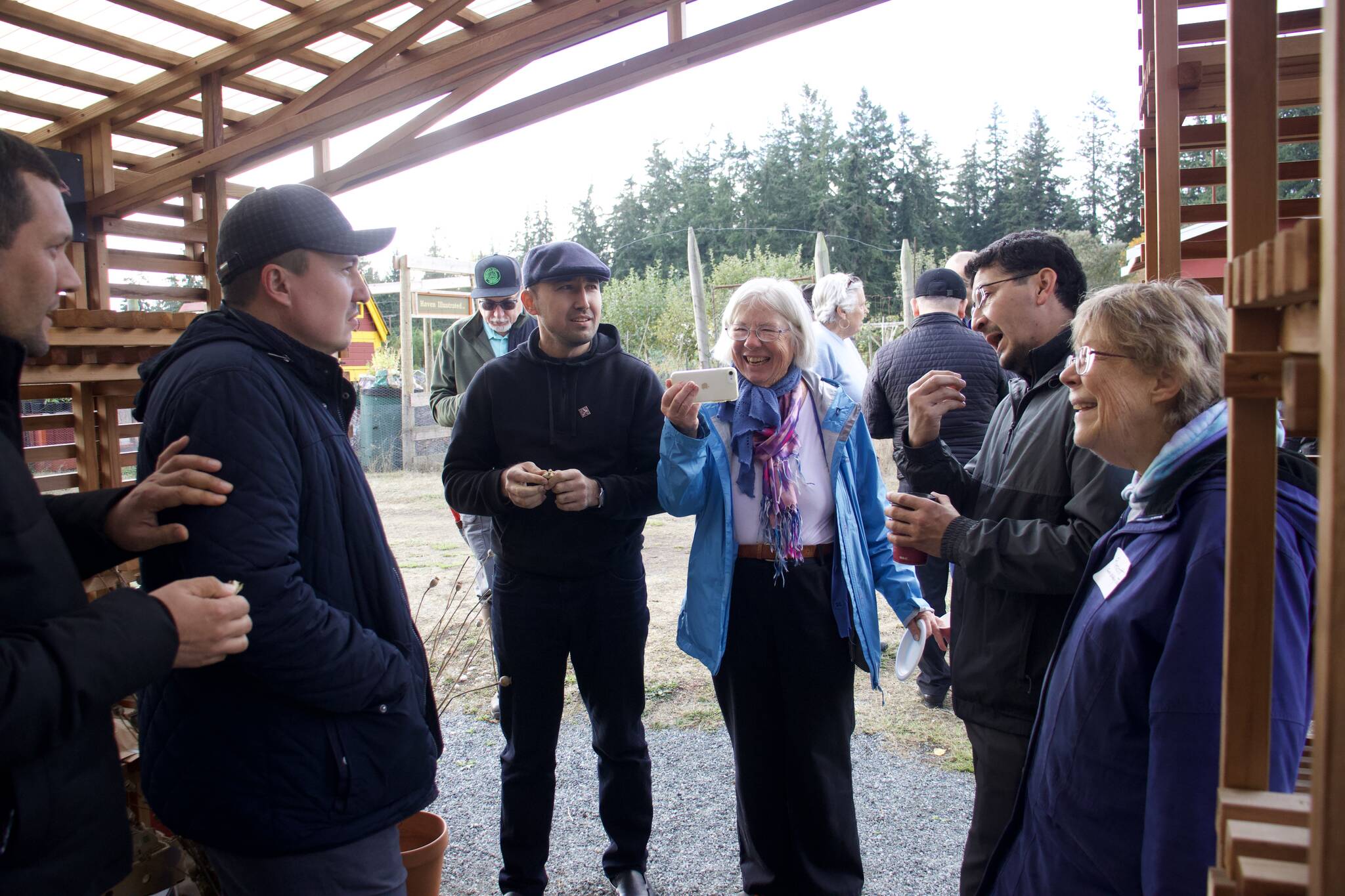Five people from a lesser-known Central Asian nation traveled over 6,000 miles to learn about agriculture from South Whidbey farmers last week.
The delegates were from Uzbekistan’s capital city of Tashkent. The trip was facilitated by the Open World program, part of the Congressional Office of International Leadership and the Seattle-Tashkent Sister Cities Organization.
The visit to the Village by the Sea has become somewhat of a tradition; different Uzbek delegations have visited six times in 20 years. The last time was in 2018.
Fred Lundahl, owner of Langley rug shop Music for the Eyes, serves as a liaison of sorts between the city of Langley and the sister city organization which was formed in 1972.
Lundahl and his wife Sharon have lived on Whidbey Island since 2003. They were diplomats for 30 years and their last posting before they retired was Uzbekistan. Music for the Eyes is filled with antique memorabilia from Central Asia.
“We got involved in the Seattle-Tashkent sister cities when we moved here,” Lundahl said.
He explained that the sister cities organization formed when the mayor of Tashkent came to visit Seattle because Alaska Airlines was offering direct flights to cities in Soviet Russia. Husnitdin Asamov, then mayor of Tashkent, became friends with Seattle Mayor Wes Uhlman. They established the first sister city relationship between an American and a Soviet city. While the Soviet Union did not last, the relationship with the former Soviet bloc nation has, and Uzbek delegates have continued to make visits to Seattle.
The delegations always go to the Boeing factory in Everett as Uzbekistan Airways is an all-Boeing airline.
“Since they’re already in Everett at the Boeing Factory, we thought it would be fun, since they are a double land-locked country with no saltwater anywhere, to put them on a ferry and bring them over to Whidbey Island,” Lundahl said.
Each one of the delegations that have made the trip to Langley have done so for a different purpose. This year, the delegates all worked in the agricultural sector and came to learn more about the island’s farming practices. Two delegates worked for Uzbekistan’s Ministry of Agriculture, one was the owner of an agricultural business and another was the founder of a TV station that runs educational programs about agriculture.
On Nov. 1, the delegates, Langley Mayor Scott Chaplin, an interpreter and farmers Susan Prescott and Anza Muenchow of South Whidbey Tilth sat around a table at Langley’s Village Pizzeria. Across a table piled high with pizza, they connected in the most time-honored way possible – over food and good conversation.
Chaplin showed up to lunch at the restaurant wearing a baseball hat embroidered with a traditional Uzbek pattern. He told the delegates about how he grew up working on his family’s farm in Nova Scotia.
“Whidbey Island actually has a lot to teach them in terms of innovative ways of approaching agriculture – which is the focus of their group – in terms of smaller scale, organic alternative energy and other aspects. … So it’s a good fit,” Chaplin said.
Bekhzod Azamov, a facilitator of the trip, said the delegates enjoyed the weather, cleanliness and fresh air on the island, which is much different from their large city of Tashkent that has a population of over 2 million people.
Before leaving the pizzeria, the delegates presented Chaplin with gifts that included a decorative bowl and a painting of Tashkent’s historic city.
After lunch, Charlotte Chase, a retired college professor who organized the tour, took the delegates to several places on the island for learning opportunities, including the Organic Farm School, Good Cheer Food Bank’s farm and Spoiled Dog Winery.
At South Whidbey Tilth, Prescott and Muenchow gave a tour of the farm. They showed where the farmers market takes place and the community gardens. The delegates had a lot of questions and were particularly interested in a compost fence in one of the gardens.
Jennifer Carlson, lead educator at Tilth, explained how the members of the group deposited heavy items that won’t decompose normally into the hollow fence. The material slowly drops through the fence until it reaches soil and “feeds the plants on either side of the fence,” Carlson said, adding that the fence also blocks the wind and creates shade for growing lettuce and greens.
The delegates were also interested in the classes Tilth offers and how the community gardens work. They asked about whether people hunted deer on the island and what poppy seeds were used for.
As per tradition, the tour of Whidbey Island ended at Lundahl’s shop, which was decked out in Uzbek flags for the occasion. Lundahl said that for a country which was communist for 70 years and had no private ownership of land until 1992, Uzbeks are still learning how to get more people involved in agriculture. The tour showcased farming practices at a wide variety of places — everything from a winery to an alpaca farm to a community garden to a farm school.
When asked if he thought another delegation would make the trip to Langley again someday, Lundahl replied, “I’m sure there will be.”


